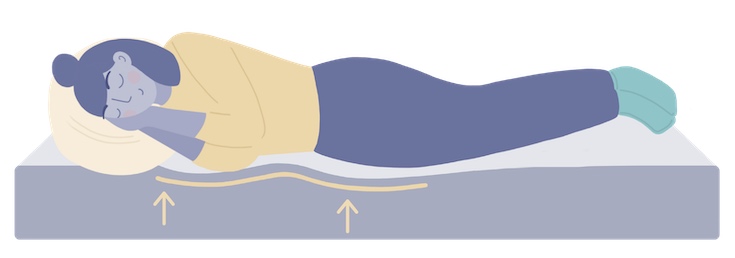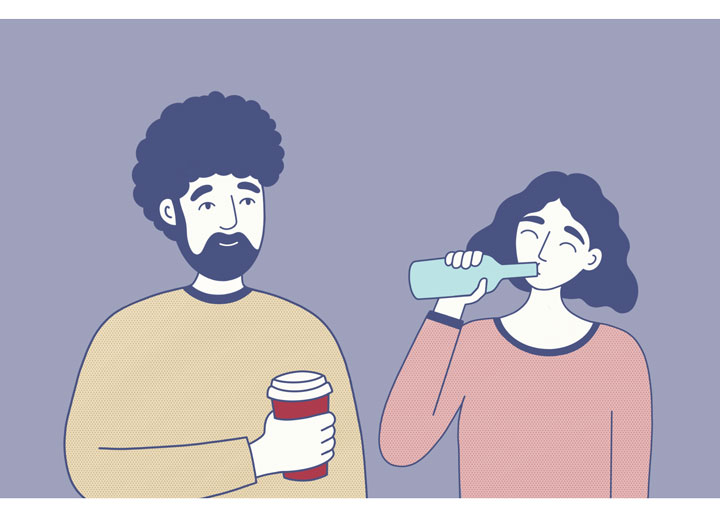Snoring isn’t just loud and annoying – it can also disrupt your precious sleep. But what causes snoring? The answer isn’t always so simple.
To help you get to the root of the problem, we’ll outline the major causes of snoring and share helpful remedies.
What Causes Snoring?
Snoring occurs when blocked airways cause facial tissues to vibrate against each other. This leads to a harsh rattling noise that often irritates sleepers and their bed partners.
But what’s restricting the airways? It’s not always cut and dry. Here are the main reasons people snore at night:
Sleeping Position
Though it’s possible to snore in any sleeping position, back sleepers tend to experience it the most. When you rest on your back, your tongue relaxes and falls backward, blocking your throat. Your throat tissues also relax. When you are breathing at night and the air hits the soft tissues, it causes a vibration which results in snoring.

If you want to switch up your sleeping position, you may need to adjust your mattress. Side sleepers, for example, need softer beds that can absorb pressure along their shoulders and hips. Stomach sleepers need especially firm mattresses in order to keep their backs in the proper alignment. For some options, check out our list of the best mattresses for people who snore.
Sleep Deprivation
Sleep deprivation can cause the throat to relax more than it normally does, so you may find yourself snoring after pulling an all-nighter. Fortunately, this problem resolves itself whenever you get consistent quality sleep.
Thick Soft Palate
The soft palate, which consists of muscle and connective tissue, forms the roof of your mouth. Folks with thick and low soft palates tend to snore more than others because their anatomy blocks airways.
Long Uvula
The shape of your uvula, the triangular piece of tissue that hangs from the soft palate, can also cause snoring issues. If you have a particularly long uvula, it can obstruct airflow and increase vibration.
Alcohol and Drug Use
Alcohol and sedative drugs can relax your facial muscles, which may restrict airflow and cause you to snore. It’s just one of the many ways alcohol impacts sleep.

How Is Snoring Diagnosed?
Most of the time, snoring is informally diagnosed by a family member or partner. If it starts to significantly affect your day-to-day life, however, you may want to speak with your doctor. Medical professionals will ask you a series of questions about your sleep habits, diet, and lifestyle. They may also inspect your mouth, nose, and throat for any enlarged tissues.
Sometimes, snoring is an indication of a more serious condition like sleep apnea. If your doctor suspects an underlying condition, they may recommend a sleep study. Also known as polysomnograms, sleep studies measure brain wave activity, breathing patterns, heart rate, oxygen levels, sleep cycles, and snoring.
Snoring Remedies
If you sleep with a partner, they’ll probably feel relieved to know they won’t have to hear you snore for the rest of their lives. Here are several snoring remedies that will help you (and your loved ones) sleep better.
- Avoid Alcohol Before Bed – If you suspect alcohol is triggering your nighttime snores, try eliminating consumption several hours before bed.
- Change Sleeping Position – Side and stomach sleepers tend to snore less than those who rest on their backs. That’s because, when you sleep on your back, your airways are naturally narrower.
- Elevate Your Head – By raising your head, you can open nasal passageways and help prevent tissues from vibrating. The easiest way to do this is with an adjustable base. Some of these electronic bed frames even have preset options for folks who snore! You can also prop your head up with a supportive pillow, such as the Bear Contour pillow.
- Cold and Allergy Medications – Sometimes, snoring happens as a result of the common cold and seasonal allergies. If you need help keeping your airways open, reach for some over-the-counter medicine.
- Nasal Strips – Made of flexible bands, adhesive nasal strips stick to the area above a person’s nostrils. The sticky bands naturally try to straighten out, which helps open up the nostrils and allow more room for airflow.
- Nasal Cones – Nasal cones are dilators that improve airflow through your nose. They can help improve nasal airflow at night, which alleviates snoring symptoms.
- Mouth Guards – A healthcare provider may recommend an oral appliance that helps keep your jaw in the proper position for air to flow. Though often called by the same name, the mouth guards used for snoring vary from those used in sports and for nighttime teeth grinding.
- Surgery – If all other options fail, you may want to consider surgery. There are many different types of surgeries that can help snorers, including uvulopalatopharyngoplasty (UPPP), which reduces soft tissue in the soft palate. Septoplasty, which straightens a deviated septum in the nose, can also create more room for airflow. If large tonsils are impeding your breathing, your doctor may also recommend a tonsillectomy.
How Common is Snoring?
About 45% of the population snores occasionally, while 25% deal with it on a regular basis. Even so, some groups snore more than others, such as:
- Older People – Muscle tone tends to decrease as people age, and when that happens in facial tissues, it can block airways and cause folks to snore.
- Men – Men often have larger upper airways and lower hanging larynxes, which creates a larger area in the back of the throat and amplifies snoring sounds.
- People With a Family History of Snoring – Snoring is often genetic, so if your parents snore, it’s possible that you do too.
- Pregnant People – Due to weight gain and hormonal changes, pregnant people tend to snore more than others.
- Those Suffering From Colds and Allergies – When you have a stuffy nose, the blocked airways can cause you to snore.
Complications From Snoring
Occasional snoring is typically harmless, but if it’s a constant issue that disrupts your sleep, you should consult with a healthcare provider. It could be a sign of sleep apnea, a serious disorder that causes people to periodically stop and start breathing throughout the night.

Long-term snoring has some other potential side effects, such as decreased blood oxygen levels, fatigue, and high blood pressure. There’s even a correlation between snoring and heart attacks, strokes, and Type 2 diabetes, so it may prove valuable to speak with your doctor about your snoring issues.
FAQs
Still have questions about snoring and sleep health? We’ve got you covered. Check out our FAQ section below.
What is the main cause of snoring?
Snoring is caused by blocked airways. When someone doesn’t have a lot of room for airflow through their nose or the back of their throat, the surrounding tissues can vibrate and produce a distinct sound. Many things can cause blocked nasal and throat passageways, including sleeping position, alcohol use, and overall anatomy
How can I stop my snoring?
There are many ways to stop snoring. If it’s caused by a cold or allergy, simply taking an over-the-counter medicine can open airways and provide relief. Back sleepers tend to snore more than others, so sometimes solving the problem is as easy as switching sleeping positions. If snoring is caused by a person’s thick soft palate or long uvula, surgery may be required.
Is it unhealthy to snore?
In most cases, snoring is completely harmless. If it starts to impede your sleep quality, however, it could be part of a bigger issue like sleep apnea. Consult with your doctor if you suspect snoring is affecting your day-to-day life.
Is it normal to snore every night?
Only about 25% of the population snores regularly, so it’s not particularly common. However, if it’s not negatively impacting you or your partner’s life, it’s not something to worry about. And many times, snoring can be solved by simple lifestyle changes.

